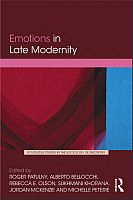Emotions in Late Modernity
Proposal review
Contributor(s)
Patulny, Roger (editor)
Bellocchi, Alberto (editor)
Olson, Rebecca E. (editor)
Khorana, Sukhmani (editor)
McKenzie, Jordan (editor)
Peterie, Michelle (editor)
Language
EnglishAbstract
This international collection discusses how the individualised, reflexive, late modern era has changed the way we experience and act on our emotions. Divided into four sections that include studies ranging across multiple continents and centuries, Emotions in Late Modernity does the following: Demonstrates an increased awareness and experience of emotional complexity in late modernity by challenging the legal emotional/rational divide; positive/negative concepts of emotional valence; sociological/ philosophical/psychological divisions around emotion, morality and gender; and traditional understandings of love and loneliness. Reveals tension between collectivised and individualised-privatised emotions in investigating ‘emotional sharing’ and individualised responsibility for anger crimes in courtrooms; and the generation of emotional energy and achievement emotions in classrooms. Debates the increasing mediation of emotions by contrasting their historical mediation (through texts and bodies) with contemporary digital mediation of emotions in classroom teaching, collective mobilisations (e.g. riots) and film and documentary representations. Demonstrates reflexive micro and macro management of emotions, with examinations of the ‘politics of fear’ around asylum seeking and religious subjects, and collective commitment to climate change mitigation. The first collection to investigate the changing nature of emotional experience in contemporary times, Emotions in Late Modernity will appeal to students and researchers interested in fields such as sociology of emotions, cultural studies, political science and psychology.
Keywords
Society and culture: general; SociologyDOI
10.4324/9781351133319Publisher
Taylor & FrancisPublisher website
https://taylorandfrancis.com/Publication date and place
2019Imprint
RoutledgeSeries
Routledge Studies in the Sociology of Emotions,Classification
Society and culture: general
Sociology


 Download
Download